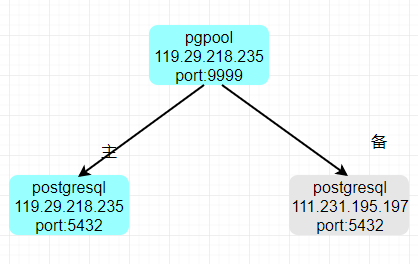安装postgresql
安装pgpool
rpm -ivh http://www.pgpool.net/yum/rpms/3.7/redhat/rhel-7-x86_64/pgpool-II-release-3.7-1.noarch.rpm
yum -y install pgpool-II-pg95
yum -y install pgpool-II-pg95-debuginfo
yum -y install pgpool-II-pg95-devel
yum -y install pgpool-II-pg95-extensions
开机启动
systemctl enable pgpool
添加Pgpool-II运行用户
[root@im110 pgpool-II]# useradd pgpool
[root@im110 pgpool-II]# passwd pgpool
Changing password for user pgpool.
New password:
Retype new password:
passwd: all authentication tokens updated successfully.
[root@im110 pgpool-II]# chown -R pgpool.pgpool /etc/pgpool-II
[root@im110 pgpool-II]# mkdir -p /var/run/pgpool/
[root@im110 pgpool-II]# chown pgpool.pgpool /var/run/pgpool/修改配置文件
先备份所有配置文件
vi pgpool.conf修改后如下


# ----------------------------
# pgPool-II configuration file
# ----------------------------
#
# This file consists of lines of the form:
#
# name = value
#
# Whitespace may be used. Comments are introduced with "#" anywhere on a line.
# The complete list of parameter names and allowed values can be found in the
# pgPool-II documentation.
#
# This file is read on server startup and when the server receives a SIGHUP
# signal. If you edit the file on a running system, you have to SIGHUP the
# server for the changes to take effect, or use "pgpool reload". Some
# parameters, which are marked below, require a server shutdown and restart to
# take effect.
#
#------------------------------------------------------------------------------
# CONNECTIONS
#------------------------------------------------------------------------------
# - pgpool Connection Settings -
listen_addresses = '*'
# Host name or IP address to listen on:
# '*' for all, '' for no TCP/IP connections
# (change requires restart)
port = 9999
# Port number
# (change requires restart)
socket_dir = '/var/run/postgresql'
# Unix domain socket path
# The Debian package defaults to
# /var/run/postgresql
# (change requires restart)
listen_backlog_multiplier = 2
# Set the backlog parameter of listen(2) to
# num_init_children * listen_backlog_multiplier.
# (change requires restart)
serialize_accept = off
# whether to serialize accept() call to avoid thundering herd problem
# (change requires restart)
# - pgpool Communication Manager Connection Settings -
pcp_listen_addresses = '*'
# Host name or IP address for pcp process to listen on:
# '*' for all, '' for no TCP/IP connections
# (change requires restart)
pcp_port = 9898
# Port number for pcp
# (change requires restart)
pcp_socket_dir = '/var/run/postgresql'
# Unix domain socket path for pcp
# The Debian package defaults to
# /var/run/postgresql
# (change requires restart)
# - Backend Connection Settings -
backend_hostname0 = '119.29.218.235'
# Host name or IP address to connect to for backend 0
backend_port0 = 5432
# Port number for backend 0
backend_weight0 = 1
# Weight for backend 0 (only in load balancing mode)
backend_data_directory0 = '/var/lib/pgsql/data'
# Data directory for backend 0
backend_flag0 = 'ALLOW_TO_FAILOVER'
# Controls various backend behavior
# ALLOW_TO_FAILOVER, DISALLOW_TO_FAILOVER
# or ALWAYS_MASTER
backend_hostname1 = '111.231.195.197'
backend_port1 = 5432
backend_weight1 = 1
backend_data_directory1 = '/var/lib/pgsql/data'
backend_flag1 = 'ALLOW_TO_FAILOVER'
# - Authentication -
enable_pool_hba = on
# Use pool_hba.conf for client authentication
pool_passwd = 'pool_passwd'
# File name of pool_passwd for md5 authentication.
# "" disables pool_passwd.
# (change requires restart)
authentication_timeout = 60
# Delay in seconds to complete client authentication
# 0 means no timeout.
# - SSL Connections -
ssl = off
# Enable SSL support
# (change requires restart)
#ssl_key = './server.key'
# Path to the SSL private key file
# (change requires restart)
#ssl_cert = './server.cert'
# Path to the SSL public certificate file
# (change requires restart)
#ssl_ca_cert = ''
# Path to a single PEM format file
# containing CA root certificate(s)
# (change requires restart)
#ssl_ca_cert_dir = ''
# Directory containing CA root certificate(s)
# (change requires restart)
#------------------------------------------------------------------------------
# POOLS
#------------------------------------------------------------------------------
# - Concurrent session and pool size -
num_init_children = 32
# Number of concurrent sessions allowed
# (change requires restart)
max_pool = 4
# Number of connection pool caches per connection
# (change requires restart)
# - Life time -
child_life_time = 300
# Pool exits after being idle for this many seconds
child_max_connections = 0
# Pool exits after receiving that many connections
# 0 means no exit
connection_life_time = 0
# Connection to backend closes after being idle for this many seconds
# 0 means no close
client_idle_limit = 0
# Client is disconnected after being idle for that many seconds
# (even inside an explicit transactions!)
# 0 means no disconnection
#------------------------------------------------------------------------------
# LOGS
#------------------------------------------------------------------------------
# - Where to log -
log_destination = 'stderr'
# Where to log
# Valid values are combinations of stderr,
# and syslog. Default to stderr.
# - What to log -
log_line_prefix = '%t: pid %p: ' # printf-style string to output at beginning of each log line.
log_connections = off
# Log connections
log_hostname = off
# Hostname will be shown in ps status
# and in logs if connections are logged
log_statement = off
# Log all statements
log_per_node_statement = off
# Log all statements
# with node and backend informations
log_standby_delay = 'none'
# Log standby delay
# Valid values are combinations of always,
# if_over_threshold, none
# - Syslog specific -
syslog_facility = 'LOCAL0'
# Syslog local facility. Default to LOCAL0
syslog_ident = 'pgpool'
# Syslog program identification string
# Default to 'pgpool'
# - Debug -
#log_error_verbosity = default # terse, default, or verbose messages
#client_min_messages = notice # values in order of decreasing detail:
# debug5
# debug4
# debug3
# debug2
# debug1
# log
# notice
# warning
# error
#log_min_messages = warning # values in order of decreasing detail:
# debug5
# debug4
# debug3
# debug2
# debug1
# info
# notice
# warning
# error
# log
# fatal
# panic
#------------------------------------------------------------------------------
# FILE LOCATIONS
#------------------------------------------------------------------------------
pid_file_name = '/var/run/pgpool/pgpool.pid'
# PID file name
# Can be specified as relative to the"
# location of pgpool.conf file or
# as an absolute path
# (change requires restart)
logdir = '/var/log/pgpool'
# Directory of pgPool status file
# (change requires restart)
#------------------------------------------------------------------------------
# CONNECTION POOLING
#------------------------------------------------------------------------------
connection_cache = on
# Activate connection pools
# (change requires restart)
# Semicolon separated list of queries
# to be issued at the end of a session
# The default is for 8.3 and later
reset_query_list = 'ABORT; DISCARD ALL'
# The following one is for 8.2 and before
#reset_query_list = 'ABORT; RESET ALL; SET SESSION AUTHORIZATION DEFAULT'
#------------------------------------------------------------------------------
# REPLICATION MODE
#------------------------------------------------------------------------------
replication_mode = off
# Activate replication mode
# (change requires restart)
replicate_select = off
# Replicate SELECT statements
# when in replication mode
# replicate_select is higher priority than
# load_balance_mode.
insert_lock = on
# Automatically locks a dummy row or a table
# with INSERT statements to keep SERIAL data
# consistency
# Without SERIAL, no lock will be issued
lobj_lock_table = ''
# When rewriting lo_creat command in
# replication mode, specify table name to
# lock
# - Degenerate handling -
replication_stop_on_mismatch = off
# On disagreement with the packet kind
# sent from backend, degenerate the node
# which is most likely "minority"
# If off, just force to exit this session
failover_if_affected_tuples_mismatch = off
# On disagreement with the number of affected
# tuples in UPDATE/DELETE queries, then
# degenerate the node which is most likely
# "minority".
# If off, just abort the transaction to
# keep the consistency
#------------------------------------------------------------------------------
# LOAD BALANCING MODE
#------------------------------------------------------------------------------
load_balance_mode = off
# Activate load balancing mode
# (change requires restart)
ignore_leading_white_space = on
# Ignore leading white spaces of each query
white_function_list = ''
# Comma separated list of function names
# that don't write to database
# Regexp are accepted
black_function_list = 'nextval,setval,nextval,setval'
# Comma separated list of function names
# that write to database
# Regexp are accepted
database_redirect_preference_list = ''
# comma separated list of pairs of database and node id.
# example: postgres:primary,mydb[0-4]:1,mydb[5-9]:2'
# valid for streaming replicaton mode only.
app_name_redirect_preference_list = ''
# comma separated list of pairs of app name and node id.
# example: 'psql:primary,myapp[0-4]:1,myapp[5-9]:standby'
# valid for streaming replicaton mode only.
allow_sql_comments = off
# if on, ignore SQL comments when judging if load balance or
# query cache is possible.
# If off, SQL comments effectively prevent the judgment
# (pre 3.4 behavior).
#------------------------------------------------------------------------------
# MASTER/SLAVE MODE
#------------------------------------------------------------------------------
master_slave_mode = off
# Activate master/slave mode
# (change requires restart)
master_slave_sub_mode = 'stream'
# Master/slave sub mode
# Valid values are combinations stream, slony
# or logical. Default is stream.
# (change requires restart)
# - Streaming -
sr_check_period = 0
# Streaming replication check period
# Disabled (0) by default
sr_check_user = 'postgres'
# Streaming replication check user
# This is necessary even if you disable
# streaming replication delay check with
# sr_check_period = 0
sr_check_password = 'your pass word'
# Password for streaming replication check user
sr_check_database = 'postgres'
# Database name for streaming replication check
delay_threshold = 0
# Threshold before not dispatching query to standby node
# Unit is in bytes
# Disabled (0) by default
# - Special commands -
follow_master_command = ''
# Executes this command after master failover
# Special values:
# %d = node id
# %h = host name
# %p = port number
# %D = database cluster path
# %m = new master node id
# %H = hostname of the new master node
# %M = old master node id
# %P = old primary node id
# %r = new master port number
# %R = new master database cluster path
# %% = '%' character
#------------------------------------------------------------------------------
# HEALTH CHECK GLOBAL PARAMETERS
#------------------------------------------------------------------------------
health_check_period = 0
# Health check period
# Disabled (0) by default
health_check_timeout = 20
# Health check timeout
# 0 means no timeout
health_check_user = 'nobody'
# Health check user
health_check_password = ''
# Password for health check user
health_check_database = ''
# Database name for health check. If '', tries 'postgres' frist, then 'template1'
health_check_max_retries = 0
# Maximum number of times to retry a failed health check before giving up.
health_check_retry_delay = 1
# Amount of time to wait (in seconds) between retries.
connect_timeout = 10000
# Timeout value in milliseconds before giving up to connect to backend.
# Default is 10000 ms (10 second). Flaky network user may want to increase
# the value. 0 means no timeout.
# Note that this value is not only used for health check,
# but also for ordinary conection to backend.
#------------------------------------------------------------------------------
# HEALTH CHECK PER NODE PARAMETERS (OPTIONAL)
#------------------------------------------------------------------------------
#health_check_period0 = 0
#health_check_timeout0 = 20
#health_check_user0 = 'nobody'
#health_check_password0 = ''
#health_check_database0 = ''
#health_check_max_retries0 = 0
#health_check_retry_delay0 = 1
#connect_timeout0 = 10000
#------------------------------------------------------------------------------
# FAILOVER AND FAILBACK
#------------------------------------------------------------------------------
failover_command = '/usr/local/bin/failover_stream.sh %d %H /tmp/trigger_file0'
# Executes this command at failover
# Special values:
# %d = node id
# %h = host name
# %p = port number
# %D = database cluster path
# %m = new master node id
# %H = hostname of the new master node
# %M = old master node id
# %P = old primary node id
# %r = new master port number
# %R = new master database cluster path
# %% = '%' character
failback_command = ''
# Executes this command at failback.
# Special values:
# %d = node id
# %h = host name
# %p = port number
# %D = database cluster path
# %m = new master node id
# %H = hostname of the new master node
# %M = old master node id
# %P = old primary node id
# %r = new master port number
# %R = new master database cluster path
# %% = '%' character
fail_over_on_backend_error = on
# Initiates failover when reading/writing to the
# backend communication socket fails
# If set to off, pgpool will report an
# error and disconnect the session.
search_primary_node_timeout = 300
# Timeout in seconds to search for the
# primary node when a failover occurs.
# 0 means no timeout, keep searching
# for a primary node forever.
#------------------------------------------------------------------------------
# ONLINE RECOVERY
#------------------------------------------------------------------------------
recovery_user = 'nobody'
# Online recovery user
recovery_password = ''
# Online recovery password
recovery_1st_stage_command = ''
# Executes a command in first stage
recovery_2nd_stage_command = ''
# Executes a command in second stage
recovery_timeout = 90
# Timeout in seconds to wait for the
# recovering node's postmaster to start up
# 0 means no wait
client_idle_limit_in_recovery = 0
# Client is disconnected after being idle
# for that many seconds in the second stage
# of online recovery
# 0 means no disconnection
# -1 means immediate disconnection
#------------------------------------------------------------------------------
# WATCHDOG
#------------------------------------------------------------------------------
# - Enabling -
use_watchdog = off
# Activates watchdog
# (change requires restart)
# -Connection to up stream servers -
trusted_servers = ''
# trusted server list which are used
# to confirm network connection
# (hostA,hostB,hostC,...)
# (change requires restart)
ping_path = '/bin'
# ping command path
# (change requires restart)
# - Watchdog communication Settings -
wd_hostname = ''
# Host name or IP address of this watchdog
# (change requires restart)
wd_port = 9000
# port number for watchdog service
# (change requires restart)
wd_priority = 1
# priority of this watchdog in leader election
# (change requires restart)
wd_authkey = ''
# Authentication key for watchdog communication
# (change requires restart)
wd_ipc_socket_dir = '/var/run/postgresql'
# Unix domain socket path for watchdog IPC socket
# The Debian package defaults to
# /var/run/postgresql
# (change requires restart)
# - Virtual IP control Setting -
delegate_IP = ''
# delegate IP address
# If this is empty, virtual IP never bring up.
# (change requires restart)
if_cmd_path = '/sbin'
# path to the directory where if_up/down_cmd exists
# (change requires restart)
if_up_cmd = 'ip addr add $_IP_$/24 dev eth0 label eth0:0'
# startup delegate IP command
# (change requires restart)
if_down_cmd = 'ip addr del $_IP_$/24 dev eth0'
# shutdown delegate IP command
# (change requires restart)
arping_path = '/usr/sbin'
# arping command path
# (change requires restart)
arping_cmd = 'arping -U $_IP_$ -w 1'
# arping command
# (change requires restart)
# - Behaivor on escalation Setting -
clear_memqcache_on_escalation = on
# Clear all the query cache on shared memory
# when standby pgpool escalate to active pgpool
# (= virtual IP holder).
# This should be off if client connects to pgpool
# not using virtual IP.
# (change requires restart)
wd_escalation_command = ''
# Executes this command at escalation on new active pgpool.
# (change requires restart)
wd_de_escalation_command = ''
# Executes this command when master pgpool resigns from being master.
# (change requires restart)
# - Watchdog consensus settings for failover -
failover_when_quorum_exists = on
# Only perform backend node failover
# when the watchdog cluster holds the quorum
# (change requires restart)
failover_require_consensus = on
# Perform failover when majority of Pgpool-II nodes
# aggrees on the backend node status change
# (change requires restart)
allow_multiple_failover_requests_from_node = off
# A Pgpool-II node can cast multiple votes
# for building the consensus on failover
# (change requires restart)
# - Lifecheck Setting -
# -- common --
wd_monitoring_interfaces_list = '' # Comma separated list of interfaces names to monitor.
# if any interface from the list is active the watchdog will
# consider the network is fine
# 'any' to enable monitoring on all interfaces except loopback
# '' to disable monitoring
# (change requires restart)
wd_lifecheck_method = 'heartbeat'
# Method of watchdog lifecheck ('heartbeat' or 'query' or 'external')
# (change requires restart)
wd_interval = 10
# lifecheck interval (sec) > 0
# (change requires restart)
# -- heartbeat mode --
wd_heartbeat_port = 9694
# Port number for receiving heartbeat signal
# (change requires restart)
wd_heartbeat_keepalive = 2
# Interval time of sending heartbeat signal (sec)
# (change requires restart)
wd_heartbeat_deadtime = 30
# Deadtime interval for heartbeat signal (sec)
# (change requires restart)
heartbeat_destination0 = 'host0_ip1'
# Host name or IP address of destination 0
# for sending heartbeat signal.
# (change requires restart)
heartbeat_destination_port0 = 9694
# Port number of destination 0 for sending
# heartbeat signal. Usually this is the
# same as wd_heartbeat_port.
# (change requires restart)
heartbeat_device0 = ''
# Name of NIC device (such like 'eth0')
# used for sending/receiving heartbeat
# signal to/from destination 0.
# This works only when this is not empty
# and pgpool has root privilege.
# (change requires restart)
#heartbeat_destination1 = 'host0_ip2'
#heartbeat_destination_port1 = 9694
#heartbeat_device1 = ''
# -- query mode --
wd_life_point = 3
# lifecheck retry times
# (change requires restart)
wd_lifecheck_query = 'SELECT 1'
# lifecheck query to pgpool from watchdog
# (change requires restart)
wd_lifecheck_dbname = 'template1'
# Database name connected for lifecheck
# (change requires restart)
wd_lifecheck_user = 'nobody'
# watchdog user monitoring pgpools in lifecheck
# (change requires restart)
wd_lifecheck_password = ''
# Password for watchdog user in lifecheck
# (change requires restart)
# - Other pgpool Connection Settings -
#other_pgpool_hostname0 = 'host0'
# Host name or IP address to connect to for other pgpool 0
# (change requires restart)
#other_pgpool_port0 = 5432
# Port number for other pgpool 0
# (change requires restart)
#other_wd_port0 = 9000
# Port number for other watchdog 0
# (change requires restart)
#other_pgpool_hostname1 = 'host1'
#other_pgpool_port1 = 5432
#other_wd_port1 = 9000
#------------------------------------------------------------------------------
# OTHERS
#------------------------------------------------------------------------------
relcache_expire = 0
# Life time of relation cache in seconds.
# 0 means no cache expiration(the default).
# The relation cache is used for cache the
# query result against PostgreSQL system
# catalog to obtain various information
# including table structures or if it's a
# temporary table or not. The cache is
# maintained in a pgpool child local memory
# and being kept as long as it survives.
# If someone modify the table by using
# ALTER TABLE or some such, the relcache is
# not consistent anymore.
# For this purpose, cache_expiration
# controls the life time of the cache.
relcache_size = 256
# Number of relation cache
# entry. If you see frequently:
# "pool_search_relcache: cache replacement happend"
# in the pgpool log, you might want to increate this number.
check_temp_table = on
# If on, enable temporary table check in SELECT statements.
# This initiates queries against system catalog of primary/master
# thus increases load of master.
# If you are absolutely sure that your system never uses temporary tables
# and you want to save access to primary/master, you could turn this off.
# Default is on.
check_unlogged_table = on
# If on, enable unlogged table check in SELECT statements.
# This initiates queries against system catalog of primary/master
# thus increases load of master.
# If you are absolutely sure that your system never uses unlogged tables
# and you want to save access to primary/master, you could turn this off.
# Default is on.
#------------------------------------------------------------------------------
# IN MEMORY QUERY MEMORY CACHE
#------------------------------------------------------------------------------
memory_cache_enabled = off
# If on, use the memory cache functionality, off by default
memqcache_method = 'shmem'
# Cache storage method. either 'shmem'(shared memory) or
# 'memcached'. 'shmem' by default
# (change requires restart)
memqcache_memcached_host = 'localhost'
# Memcached host name or IP address. Mandatory if
# memqcache_method = 'memcached'.
# Defaults to localhost.
# (change requires restart)
memqcache_memcached_port = 11211
# Memcached port number. Mondatory if memqcache_method = 'memcached'.
# Defaults to 11211.
# (change requires restart)
memqcache_total_size = 67108864
# Total memory size in bytes for storing memory cache.
# Mandatory if memqcache_method = 'shmem'.
# Defaults to 64MB.
# (change requires restart)
memqcache_max_num_cache = 1000000
# Total number of cache entries. Mandatory
# if memqcache_method = 'shmem'.
# Each cache entry consumes 48 bytes on shared memory.
# Defaults to 1,000,000(45.8MB).
# (change requires restart)
memqcache_expire = 0
# Memory cache entry life time specified in seconds.
# 0 means infinite life time. 0 by default.
# (change requires restart)
memqcache_auto_cache_invalidation = on
# If on, invalidation of query cache is triggered by corresponding
# DDL/DML/DCL(and memqcache_expire). If off, it is only triggered
# by memqcache_expire. on by default.
# (change requires restart)
memqcache_maxcache = 409600
# Maximum SELECT result size in bytes.
# Must be smaller than memqcache_cache_block_size. Defaults to 400KB.
# (change requires restart)
memqcache_cache_block_size = 1048576
# Cache block size in bytes. Mandatory if memqcache_method = 'shmem'.
# Defaults to 1MB.
# (change requires restart)
memqcache_oiddir = '/var/log/pgpool/oiddir'
# Temporary work directory to record table oids
# (change requires restart)
white_memqcache_table_list = ''
# Comma separated list of table names to memcache
# that don't write to database
# Regexp are accepted
black_memqcache_table_list = ''
# Comma separated list of table names not to memcache
# that don't write to database
# Regexp are acceptedvi pool_hba.conf修改后如下


# pgpool Client Authentication Configuration File
# ===============================================
#
# The format rule in this file follows the rules in the PostgreSQL
# Administrator's Guide. Refer to chapter "Client Authentication" for a
# complete description. A short synopsis follows.
#
# This file controls: which hosts are allowed to connect, how clients
# are authenticated, which user names they can use, which databases they
# can access. Records take one of these forms:
#
# local DATABASE USER METHOD [OPTION]
# host DATABASE USER CIDR-ADDRESS METHOD [OPTION]
#
# (The uppercase items must be replaced by actual values.)
#
# The first field is the connection type: "local" is a Unix-domain
# socket, "host" is either a plain or SSL-encrypted TCP/IP socket.
#
# DATABASE can be "all", "sameuser", a database name, or a comma-separated
# list thereof. Note that "samegroup" like in PostgreSQL's pg_hba.conf
# file is not supported, since pgpool does not know which group a user
# belongs to. Also note that the database specified here may not exist in
# the backend PostgreSQL. pgpool will authenticate based on the database's
# name, not based on whether it exists or not.
#
# USER can be "all", a user name, or a comma-separated list thereof. In
# both the DATABASE and USER fields you can also write a file name prefixed
# with "@" to include names from a separate file. Note that a group name
# prefixed with "+" like in PostgreSQL's pg_hba.conf file is not supported
# because of the same reason as "samegroup" token. Also note that a user
# name specified here may not exist in the backend PostgreSQL. pgpool will
# authenticate based on the user's name, not based on whether he/she exists.
#
# CIDR-ADDRESS specifies the set of hosts the record matches.
# It is made up of an IP address and a CIDR mask that is an integer
# (between 0 and 32 (IPv4) that specifies the number of significant bits in
# the mask. Alternatively, you can write an IP address and netmask in
# separate columns to specify the set of hosts.
#
# METHOD can be "trust", "reject", "md5" or "pam". Note that "pam" sends passwords
# in clear text.
#
# OPTION is the name of the PAM service. Default service name is "pgpool"
#
# Database and user names containing spaces, commas, quotes and other special
# characters must be quoted. Quoting one of the keywords "all" or "sameuser"
# makes the name lose its special character, and just match a database or
# username with that name.
#
# This file is read on pgpool startup. If you edit the file on a running
# system, you have to restart the pgpool for the changes to take effect.
# Put your actual configuration here
# ----------------------------------
#
# If you want to allow non-local connections, you need to add more
# "host" records. In that case you will also need to make pgpool listen
# on a non-local interface via the listen_addresses configuration parameter.
#
# TYPE DATABASE USER CIDR-ADDRESS METHOD
# "local" is for Unix domain socket connections only
local all all trust
# IPv4 local connections:
host all all 0.0.0.0/0 md5
#host all all 127.0.0.1/32 trust
host all all ::1/128 trust启用配置文件pool_passwd
[root@pgpool etc]# pg_md5 -m -p -u postgres pool_passwd
password:创建主从切换脚本


[root@pgpool bin]# vi /usr/local/bin/failover_stream.sh
# Failover command for streaming replication.
# This script assumes that DB node 0 is primary, and 1 is standby.
#
# If standby goes down, do nothing. If primary goes down, create a
# trigger file so that standby takes over primary node.
#
# Arguments: $1: failed node id. $2: new master hostname. $3: path to
# trigger file.
failed_node=$1
new_master=$2
trigger_file=$3
# Do nothing if standby goes down.
if [ $failed_node = 1 ]; then
exit 0;
fi
# Create the trigger file.
/usr/bin/ssh -T $new_master /bin/touch $trigger_file
exit 0;
[root@pgpool bin]# chmod 700 failover_stream.sh启动pgpool


[root@VM_176_134_centos pgpool-II]# pgpool -n -d > /tmp/pgpool.log 2>&1 &
[1] 5894
[root@VM_176_134_centos pgpool-II]# ps -aux|grep pgpool
root 763 0.0 0.0 187508 2348 pts/0 S 14:29 0:00 su pgpool
pgpool 764 0.0 0.0 116036 2712 pts/0 S 14:29 0:00 bash
root 2292 0.0 0.0 126244 1756 pts/2 S+ 14:53 0:00 vi /var/log/pgpool/pgpool_status
root 5894 0.0 0.1 90812 6656 pts/0 S 15:52 0:00 pgpool -n -d
root 5895 0.0 0.0 90812 1964 pts/0 S 15:52 0:00 pgpool: wait for connection request
root 5896 0.0 0.0 90812 1964 pts/0 S 15:52 0:00 pgpool: wait for connection request
root 5897 0.0 0.0 90812 1964 pts/0 S 15:52 0:00 pgpool: wait for connection request
root 5898 0.0 0.0 90812 1964 pts/0 S 15:52 0:00 pgpool: wait for connection request
root 5899 0.0 0.0 90812 1964 pts/0 S 15:52 0:00 pgpool: wait for connection request
root 5900 0.0 0.0 90812 1964 pts/0 S 15:52 0:00 pgpool: wait for connection request
root 5901 0.0 0.0 90812 1964 pts/0 S 15:52 0:00 pgpool: wait for connection request
root 5902 0.0 0.0 90812 1964 pts/0 S 15:52 0:00 pgpool: wait for connection request
root 5903 0.0 0.0 90812 1964 pts/0 S 15:52 0:00 pgpool: wait for connection request
root 5904 0.0 0.0 90812 1964 pts/0 S 15:52 0:00 pgpool: wait for connection request
root 5905 0.0 0.0 90812 1964 pts/0 S 15:52 0:00 pgpool: wait for connection request
root 5906 0.0 0.0 90812 1964 pts/0 S 15:52 0:00 pgpool: wait for connection request
root 5907 0.0 0.0 90812 1964 pts/0 S 15:52 0:00 pgpool: wait for connection request
root 5908 0.0 0.0 90812 1964 pts/0 S 15:52 0:00 pgpool: wait for connection request
root 5909 0.0 0.0 90812 1964 pts/0 S 15:52 0:00 pgpool: wait for connection request
root 5910 0.0 0.0 90812 1964 pts/0 S 15:52 0:00 pgpool: wait for connection request
root 5911 0.0 0.0 90812 1964 pts/0 S 15:52 0:00 pgpool: wait for connection request
root 5912 0.0 0.0 90812 1964 pts/0 S 15:52 0:00 pgpool: wait for connection request
root 5913 0.0 0.0 90812 1964 pts/0 S 15:52 0:00 pgpool: wait for connection request
root 5914 0.0 0.0 90812 1964 pts/0 S 15:52 0:00 pgpool: wait for connection request
root 5915 0.0 0.0 90812 1964 pts/0 S 15:52 0:00 pgpool: wait for connection request
root 5916 0.0 0.0 90812 1964 pts/0 S 15:52 0:00 pgpool: wait for connection request
root 5917 0.0 0.0 90812 1964 pts/0 S 15:52 0:00 pgpool: wait for connection request
root 5918 0.0 0.0 90812 1964 pts/0 S 15:52 0:00 pgpool: wait for connection request
root 5919 0.0 0.0 90812 1964 pts/0 S 15:52 0:00 pgpool: wait for connection request
root 5920 0.0 0.0 90812 1964 pts/0 S 15:52 0:00 pgpool: wait for connection request
root 5921 0.0 0.0 90812 1964 pts/0 S 15:52 0:00 pgpool: wait for connection request
root 5922 0.0 0.0 90812 1964 pts/0 S 15:52 0:00 pgpool: wait for connection request
root 5923 0.0 0.0 90812 1964 pts/0 S 15:52 0:00 pgpool: wait for connection request
root 5924 0.0 0.0 90812 1964 pts/0 S 15:52 0:00 pgpool: wait for connection request
root 5925 0.0 0.0 90812 1964 pts/0 S 15:52 0:00 pgpool: wait for connection request
root 5926 0.0 0.0 90812 1964 pts/0 S 15:52 0:00 pgpool: wait for connection request
root 5927 0.0 0.0 90816 1724 pts/0 S 15:52 0:00 pgpool: PCP: wait for connection request
root 5928 0.0 0.0 90812 1728 pts/0 S 15:52 0:00 pgpool: worker process
root 5929 0.0 0.0 90812 1728 pts/0 S 15:52 0:00 pgpool: health check process(0)
root 5960 0.0 0.0 112644 960 pts/0 R+ 15:53 0:00 grep --color=auto pgpool
[root@VM_176_134_centos pgpool-II]#启动两台服务器数据库


[root@VM_176_134_centos pgpool-II]# systemctl start postgresql
[root@VM_176_134_centos pgpool-II]# ps -aux|grep postgresql
root 6100 0.0 0.0 112644 968 pts/0 S+ 15:55 0:00 grep --color=auto postgresql
[root@VM_176_134_centos pgpool-II]# ps -aux|grep postgres
postgres 6086 0.0 0.2 232344 9368 ? S 15:55 0:00 /usr/bin/postgres -D /var/lib/pgsql/data -p 5432
postgres 6087 0.0 0.0 189968 1492 ? Ss 15:55 0:00 postgres: logger process
postgres 6089 0.0 0.0 232344 1716 ? Ss 15:55 0:00 postgres: checkpointer process
postgres 6090 0.0 0.0 232344 1724 ? Ss 15:55 0:00 postgres: writer process
postgres 6091 0.0 0.0 232344 1484 ? Ss 15:55 0:00 postgres: wal writer process
postgres 6092 0.0 0.0 233168 2872 ? Ss 15:55 0:00 postgres: autovacuum launcher process
postgres 6093 0.0 0.0 192220 1688 ? Ss 15:55 0:00 postgres: stats collector process
root 6103 0.0 0.0 112644 964 pts/0 S+ 15:55 0:00 grep --color=auto postgres
[root@VM_176_134_centos pgpool-II]#
连接测试
1.连接pgpool,能看到235的数据
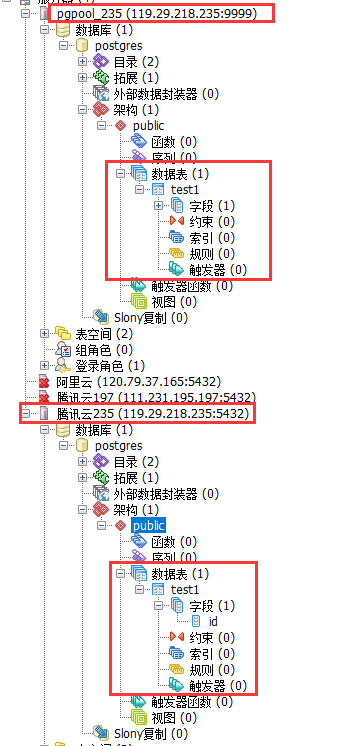
2.在pgpool新建test_pgpool表,235的数据库也可以看到表,但备机197上似乎没有看到test_pgpool
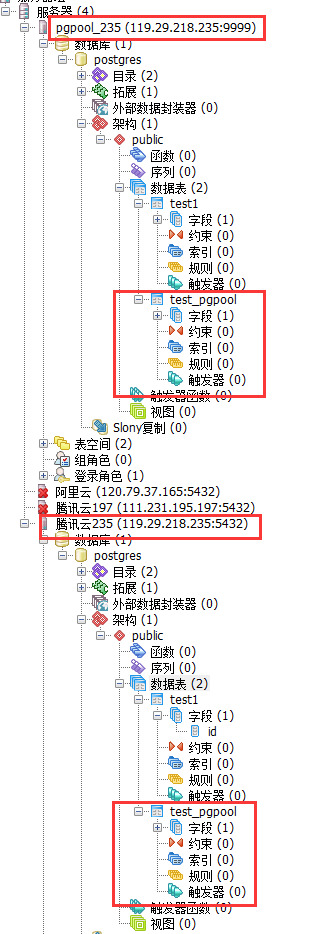
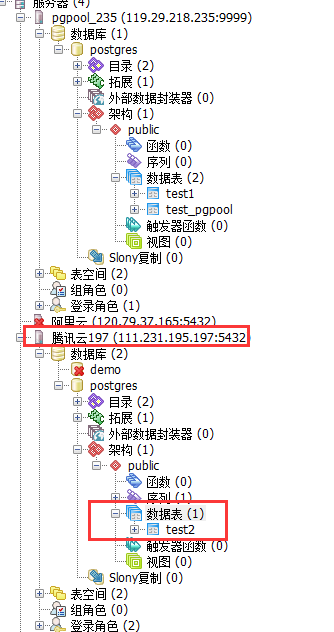
3.修改配置文件
vi pgpool.conf
改下面两个属性
replication_mode = true
load_balance_mode = true
然后关闭客户端的连接
235上停止pgpool: pgpool stop
235上启动pgpool: pgpool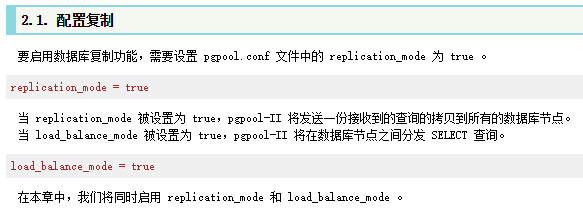
4.通过主节点建表test_pgpool2,可以看到主、备节点均有test_pgpool2
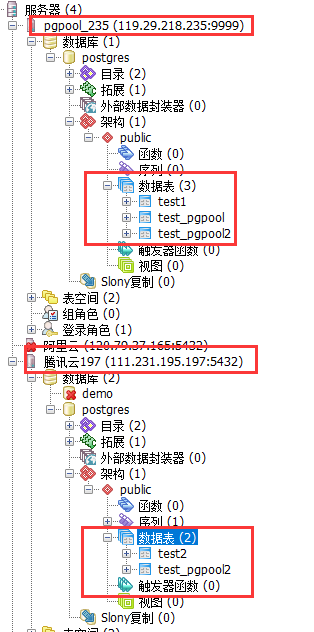
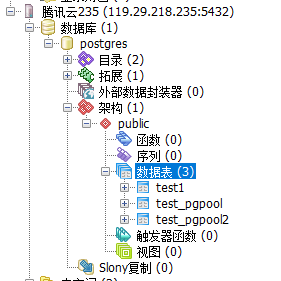
5.关掉235上的postgresql,看看能否切换到197
[root@VM_176_134_centos pgpool-II]# systemctl stop postgresql
[root@VM_176_134_centos pgpool-II]# ps -aux|grep postgres
root 7361 0.0 0.0 90912 3060 ? S 16:16 0:00 pgpool: postgres postgres 113.116.51.86(62810) idle
root 8189 0.0 0.0 112644 964 pts/0 R+ 16:31 0:00 grep --color=auto postgres
[root@VM_176_134_centos pgpool-II]#可以看到已经切换到197了,表明在运行中,如果235挂掉了,还有197可用。
但是发现再启动235后的数据库后,pgpool不会自动切回来,可能切换脚本有问题,这个不弄了,等专业的来
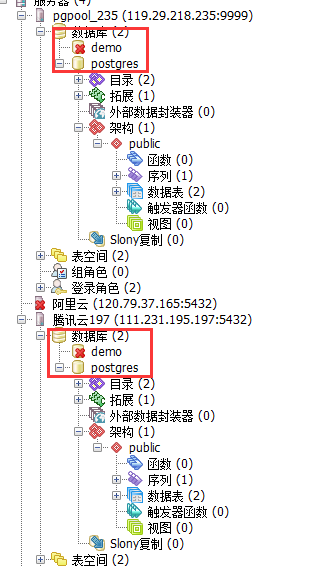
参考
官方文档:pgpool-II 入门教程
来源:oschina
链接:https://my.oschina.net/u/4277648/blog/3281274
